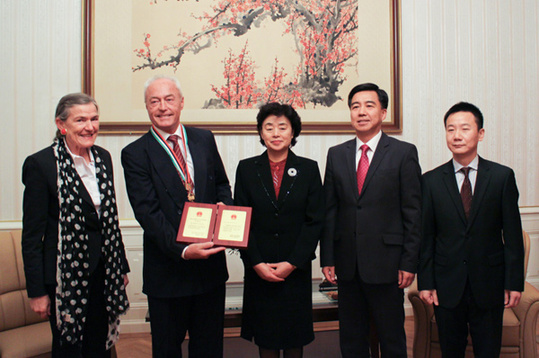|
 |
|
The State Administration of Foreign Experts Affairs honored Wilhelm Von Scoble for his contribution to the development of China’s science and technology in Vienna Austria, on Nov 6, 2014. |
A European man, a representative of one of the world's most influential sport entities, was visiting the city to execute a carefully planned mission: to observe in person the stunning abilities of the 13-year-old boy whose talent was making a nationwide impression and to evaluate whether to recruit him. In 2014, days after the boy achieved a milestone at the UEFA Champions League, this European man might be remembering proudly what was probably one of the greatest accomplishments of his life: persuading Lionel Messi, a soccer player considered by many as the greatest in history, to sign for his club at the time, FC Barcelona.
Can those designing and executing policies to attract talent in China learn something from this story? At first sight, utilizing a sports analogy to talk about policy making might sound na?ve. Also, although intimately related, talent discovery and talent attraction are not exactly the same thing. Yet, I believe that the takeaways of the Messi story are multifold. True, attracting talented individuals in areas such as science and technology requires different types of efforts than those needed to discover sports superstars. But in the essence of Lionel Messi’s linkage to FC Barcelona, there is something that applies to every discipline: organizations should always be prepared to bet on talent while it still is at its early stages. Nobody has the magic ball to read the future and know in advance which individual will ultimately be able to innovate. So here is the second takeaway of the story: organizations that intend to cultivate or attract the next superstars have to be willing to take risks.
Earlier this year, President Xi Jinping held a meeting with 50 high-level overseas experts in Shanghai. This is the second time since he became the top leader of the country in 2012 that President Xi has held a formal meeting with foreign experts. So far, China has proven to be extremely successful in attracting mature foreign talent. Take the case of Anthony J. Leggett and Edmund Phelps, two Nobel Prize winners in Physics and Economics respectively, who are presently working full-time at Chinese universities. But China has not been as successful in attracting emerging foreign talent. One of the reasons that explains this situation is the lack of knowledge about the existing opportunities in China, especially among university students in Western countries. The most important reason, however, is the lack of well-known models of talented foreign individuals who have successfully launched their careers in China.